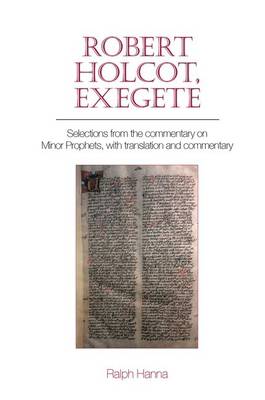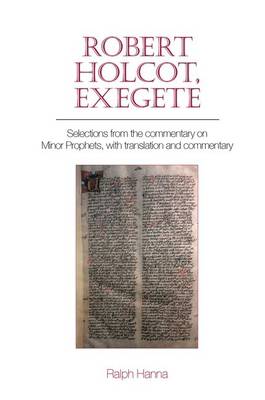
- Afhalen na 1 uur in een winkel met voorraad
- Gratis thuislevering in België vanaf € 30
- Ruim aanbod met 7 miljoen producten
- Afhalen na 1 uur in een winkel met voorraad
- Gratis thuislevering in België vanaf € 30
- Ruim aanbod met 7 miljoen producten
Robert Holcot, Exegete
Selections from the Commentary on Minor Prophets, with Translation and Commentary
Ralph HannaOmschrijving
Robert Holcot (d. 1349) was a Dominican friar, most prominently connected with the convent in Oxford where he became a Doctor of Theology. Holcot is perhaps most famous today, following an important discussion by Heiko Obermann in the 1960s, for his 'semi-Pelagian' theological views. In contrast to traditional Augustinianism, he believed that God granted salvation to individuals on the basis of 'bonum quod in se est', that is, on the basis of an individual's intention to do good, rather than any achievement. While historians of theology know Holcot in these terms, his wide medieval reputation was rather different. Holcot was read all over Europe as an exegete, an explicator of biblical texts, especially the Old Testament sapiential books.
This volume presents a selection, nearly a quarter of the whole, from Holcot's readings in the minor prophets, originally delivered in the 1330s as lectures in Oxford's Dominican studium. In a commentary appended to the text, it uses these selections to offer a view of exegesis, and of Holcot's strategies, that differs from customary scholarship on the topic. The commentary attempts to clarify the relation between Holcot's usually tacit discussion (a feature perhaps driven by the fact that the received text represents a reportatio or outline, not a stenographic transcription) and the biblical text at hand. It further addresses some argumentative features, principally Holcot's use of narrative and of imagistic distinctiones. The volume is fully annotated, with a facing-page translation, numerous references to analogous discussions elsewhere in Holcot (including his classic Super Sapientiam Salamonis), and full indexes of Holcot's biblical references, his parallel treatments, and his sources.
Specificaties
Betrokkenen
- Auteur(s):
- Uitgeverij:
Inhoud
- Aantal bladzijden:
- 264
- Taal:
- Engels
- Reeks:
Eigenschappen
- Productcode (EAN):
- 9781800859739
- Verschijningsdatum:
- 1/07/2021
- Uitvoering:
- Hardcover
- Formaat:
- Genaaid
- Afmetingen:
- 164 mm x 240 mm
- Gewicht:
- 546 g

Alleen bij Standaard Boekhandel
Beoordelingen
We publiceren alleen reviews die voldoen aan de voorwaarden voor reviews. Bekijk onze voorwaarden voor reviews.











